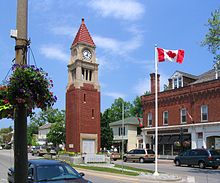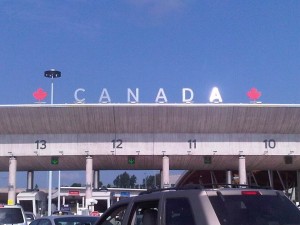 Mrs. T and I drove up to Ontario yesterday to see four plays at the Shaw Festival in Niagara-on-the-Lake, one of the prettiest and most pleasant places I know, a preternaturally neat town where the lawns look as though they were trimmed three times a day and you can’t get a bad meal unless you go out of your way to find it.
Mrs. T and I drove up to Ontario yesterday to see four plays at the Shaw Festival in Niagara-on-the-Lake, one of the prettiest and most pleasant places I know, a preternaturally neat town where the lawns look as though they were trimmed three times a day and you can’t get a bad meal unless you go out of your way to find it.
I paid my first professional visit to Canada in 2009. Since then I’ve returned to see shows every summer, both because Canadian theater is excellent and because I find the country itself to be so agreeable—and interesting. My interest, which has ripened into outright fascination, dates from my reading of Edmund Wilson’s O Canada: An American’s Notes on Canadian Culture. Part of what fascinates me is that Canada looks and sounds deceptively like its southern neighbor, but is nonetheless, as I first learned from Wilson, a very different place with a strongly distinctive and self-conscious identity of its own.
To read an article like this is to be made acutely aware of the extent to which some Canadians define that identity in terms of not being American. As Mike Myers famously said, “Canada is the essence of not being. Not English, not American, it is the mathematic of not being. And a subtle flavor—we’re more like celery as a flavor.”
 As I wrote during my first visit to Canada:
As I wrote during my first visit to Canada:
I’ve been walking around town each afternoon in search of impressions. Mostly I’m struck by how similar Canada is to America—and how intensely aware it is of its neighbor to the south. While I have no doubt that surface appearances are deceiving, it’s also true that every other story I read in the Globe and Mail, Canada’s national newspaper, is either about the United States or makes prominent reference to it….
The main thing I’ve noticed since arriving on Sunday is that everyone here seems to be nice. Granted, I’ve yet to meet a Canadian I didn’t like, but the unfailing agreeability of the people whom I’ve encountered in Stratford suggests that niceness might well be a component of the Canadian national character.
To be sure, I would never dream of generalizing with any authority about Canada based on a handful of visits. On the other hand, I have a fair number of close friends who come from there, and they all have two things in common: they are nice without exception and conspicuously ill at ease about tooting their own horns. Anyone who decides to live and work in this country is by definition self-selected for ambition, yet just about every Canadian expatriate I know is diffident to the point of shyness when it comes to acting decisively on that ambition.
 I discovered Hugh MacLennan’s The Watch That Ends the Night, my favorite Canadian novel, in 2008, and found it unusually revealing on this score. In it MacLennan refers to Canada as a “cautious country which had always done more than she had promised, had always endured in silence while others reaped the glory.” That sentence describes most of my Canadian friends to the letter.
I discovered Hugh MacLennan’s The Watch That Ends the Night, my favorite Canadian novel, in 2008, and found it unusually revealing on this score. In it MacLennan refers to Canada as a “cautious country which had always done more than she had promised, had always endured in silence while others reaped the glory.” That sentence describes most of my Canadian friends to the letter.
As far as the deceptive similarities go, they’re sometimes so conspicuous as to be downright amusing. At breakfast this morning I heard two young women conversing merrily in the nasal yap-speak that is characteristic of American women of their age: “Yah. Yah. That’s AHH-some. Yah.” Were it not for their unmistakable Canadian accents, I would have taken them to be from Los Angeles.
But Niagara-on-the-Lake is not—to put it mildly—Los Angeles, and though the Shaw Festival is one of the finest theatrical enterprises of its kind in North America, it’s not nearly so well known in the United States as it ought to be, perhaps because it’s…well, Canadian. And maybe that’s one of the reasons why I enjoy coming here so much, just as I love my Canadian friends in part because they are so very Canadian, and so very unlike me.
* * *
UPDATE: To read Mordecai Richler’s 1965 review of Edmund Wilson’s O Canada, go here.
Glenn Gould’s Toronto, originally telecast by the CBC in 1979:
